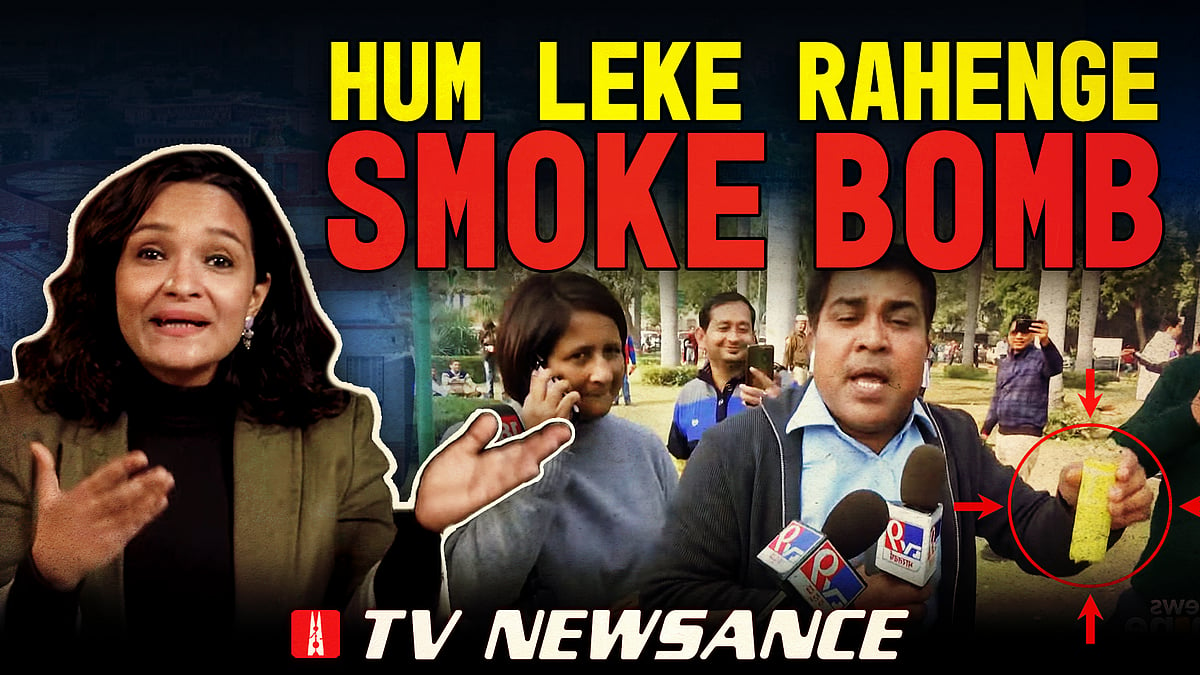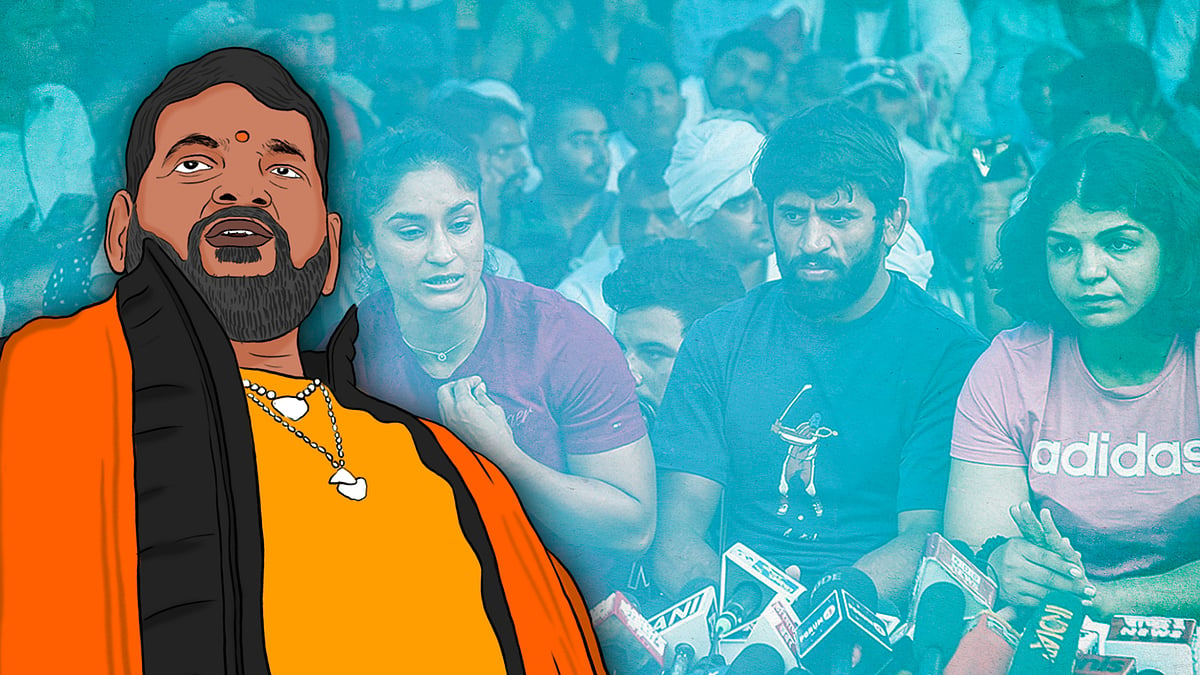From protests to Parliament: The fall of mainstream media – and why 2024 doesn’t bode well
What happens when Big Media doesn’t question and the govt wants to silence those who do?
We end this year by being reminded again that there are no clean endings when the issue of sexual harassment is raised. The face of champion wrestler Sakshi Malik, as she broke down in front of the media, could not be a more heart-rending reminder of this ugly truth.
Malik wept because little has changed.
Twelve months ago, the struggle began to draw attention to sexual harassment charges by women wrestlers against BJP MP and former Wrestling Federation of India head Brij Bhushan Sharan Singh. But not only has Singh remained untouched, his proxy Sanjay Singh won the WFI election on December 21. Newspapers carried photos of a smiling Brij Bhushan wearing garlands as if he himself had been re-elected while Sanjay, the new WFI president, stood demurely by his side.
Soon after, Malik announced that she would quit wrestling. Bajrang Punia and Virender Singh Yadav announced they would return their Padma Shri awards in solidarity. Vinesh Phogat returned her Major Dhyan Chand Khel Ratna award and Arjuna award.
Their actions remind us that, despite media attention on their struggle in the early part of the year, the government dragged its feet after persuading them to call off their agitation. It filed a case against Singh only after directions from the Supreme Court. Till date, it hasn’t reprimanded Brij Bhushan. The case against him filed by the Delhi police, which comes directly under the union home ministry, has gone nowhere.
With the issue refusing to die down, the sports ministry finally moved and suspended the newly elected WFI and Brij Bhushan said he was no longer involved in wrestling.
For the media, there are lessons to be drawn from the trajectory of this high-visibility campaign. Media attention did help the wrestlers put pressure on the government. But given the nature of the complaint (sexual harassment) and the person at the centre of it (a powerful politician), there were no tidy endings. More reason then for the media to continue to follow the story rather than wait for another dramatic event to remind us that, in under a year, precious little progress has been made on the wrestlers’ demands.
In many ways, the story of the wrestlers’ struggle for justice is the story of much of India. Dramatic public protests catch the eye of mainstream media. But once these end, or are forced to end, media attention moves on. And on issues where the people affected do not possess the social capital to launch eye-catching campaigns, there is little to no media attention.
The wrestlers’ protests ought to have reminded us in the media that despite the MeToo campaigns of 2019, the problem of sexual harassment remains an unfaltering reality that women face every day. But there is an even more dramatic example of what we don’t find in the media – or at least not enough of it.
The dramatic “attack” on Parliament by six young people trying to draw attention to unemployment and lack of freedom is another example. On the anniversary of the December 13, 2001 terror attack, two of them got into the building, jumped into the chamber where the Lok Sabha was meeting, and released canisters of some kind of coloured gas. It was front-page news, but the issues they raised have not been addressed.
Why would young people, who surely knew the consequences of this kind of protest, take such risks if they were not desperate? How representative are they of the thousands of unemployed men and women who see no future, despite the government’s boasts that the Indian economy is growing by leaps and bounds?
Although some mainstream newspapers profiled the youth and their families and wrote about their motives for undertaking such a daring form of protest, television news, as expected, continued to refer to them as “terrorists”.
Unemployment is one of the biggest stories that mainstream media has chosen not to report. The reason is obvious. A government that refuses to accept anything in the media that is even slightly critical of its policies, and has clearly indicated what it will do to tame its critics, is unlikely to look kindly at media that investigates the darker side of an ostensibly growing economy that leaves so many millions behind.
Senior journalist Ajaz Ashraf, in his column in Mid-day, is one of the few to point out why this action by the six has not got the support of even the opposition. No one wants to be seen to be sympathetic to persons charged under terror laws. Perhaps the media too has held back from taking forward the demands raised by the six.
In any case, the taming of our mainstream media by this government is almost complete. A few voices remain, principally in print. But the rest literally “follow the leader”.
The road ahead
As we now head into an election year, will we see any change in the media sphere? That is the question any journalist who believes that the job of a free media in a functioning democracy is to question the powerful must be asking as 2023 comes to an end.
The answer to that could lie in asking how many journalists have managed to continue questioning the powerful despite the current government and the threats to press freedom.
The spaces that have remained open for such questioning are mostly on independent digital platforms. Through this year, this is where we have seen some of the best investigative stories: coverage of the ongoing conflict in Manipur about which the prime minister continues to remain silent, stories on displacement, disasters, and disease, and on the despair felt by those whose stories are rarely told.
In early December, when the Mumbai Press Club announced the Red Ink awards for journalism, there was little surprise that the majority of awardees in several categories were from these small, spunky digital platforms. When the future history of these times is written, the record of what really happened will be found on these independent spaces as the traditional media, that is supposed to play the role of the recorder of history, is falling woefully short.
That said, the 2024 general elections, or even before they are held, could mean the beginning of the end of these little islands of freedom that still exist in the media sphere.
The winter session of Parliament rushed through the Telecommunications Bill 2023 even as 146 opposition MPs were suspended. The law was brought in ostensibly to regulate the telecom industry, but serious concerns have been raised about privacy of users as this article by Apar Gupta in The Wire explains.
More worrying is the draft Broadcasting Services (Regulation) Bill 2023 which was open for public comments. Designed to regulate what it terms “content creation”, the law will bring under its ambit all digital news platforms like Scroll, The Wire, The News Minute, NewsClick, Article14, Newslaundry and scores more in other languages as well as hundreds of news-related programmes on YouTube such as the one by Ravish Kumar.
These comments, made by the Internet Freedom Foundation, make it clear that if passed, this law will most certainly curtail the freedom presently enjoyed by those using the digital space for news. Let me quote this paragraph to illustrate:
“The bill extends the Ministry’s regulatory ambit to any person who broadcasts news and current affairs programs through a digital medium (such as online paper, news portal, website, social media intermediary, or other similar medium). This provision will apply to any individual, and not just media companies or journalists, who chooses to share news as part of a ‘systematic business, professional, or commercial activity’. Concerns over how “news and current affairs” is currently defined under the bill and uncertainty over the scope of application of this Clause augment concerns around erosion of democratic principles of online free speech. This will threaten journalistic expression as well as a users’ right to access multiple, diverse points of view, especially given the high penalties prescribed in the draft bill for failing to comply with ethical codes and government orders.”
I had hoped to end this on a more optimistic note. Unfortunately, given the way laws are being bulldozed through our Parliament, it is difficult to hope that this government will heed comments such as the one quoted above and many more that have been sent to the Ministry of Information and Broadcasting.
Does this government really need such a law, given that most of the mainstream media in the country rarely questions and is always ready to distract from the real issues? The fact that it has even devised such a law should tell us that this is a government that wants to paper over all the cracks, even the smallest ones that will allow for free “journalistic expression”.
 TV Newsance 234: Journalists fight over ‘smoke bomb’ after Parliament security breach
TV Newsance 234: Journalists fight over ‘smoke bomb’ after Parliament security breach ‘No camps, amenities’: How Indian wrestlers were left to ‘fend for themselves’ ahead of Asian Games
‘No camps, amenities’: How Indian wrestlers were left to ‘fend for themselves’ ahead of Asian Games